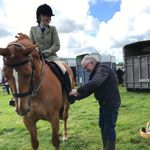What Comes Next: Protecting the Next Generation of Equestrians

What happened to Katie should never have happened. And yet it did. The question now is: what comes next? How do we ensure the next generation of riders grow up in an equestrian world where cases like hers are not repeated, where silence is not the default, and where safeguarding is not left to chance?
Breaking with tradition to protect the future
For decades, equestrian sport has operated on inherited traditions — many of them powerful, many of them positive, but some of them dangerous. Hierarchies that place unquestionable authority in the hands of a few. Cultures where obedience can be prized more than curiosity. Spaces where young riders are taught to be grateful, no matter the circumstances.
To protect the next generation, we must be brave enough to break with the parts of tradition that no longer serve us. That means naming the risks openly and dismantling the silence that has protected abusers for too long.
Safeguarding is not a policy, it is a practice
Safeguarding cannot live in a handbook or a single page on a governing body’s website. It must be a lived, breathing practice in every stable, riding school, and competition ground. That means:
- Mandatory safeguarding training for all coaches, trainers, and volunteers who work with young people.
- Clear and confidential reporting systems that are accessible to riders and parents at every level.
- Independent safeguarding officers in every organisation, empowered to act without fear of conflict of interest.
- Regular auditing and accountability — safeguarding should be measured and reported just as seriously as competition results.
Listening to young voices
Improving for the next generation means listening to the next generation. Too often, young riders are spoken about but not spoken with. Their lived experiences, their worries, and their ideas are invaluable. Creating youth advisory panels within federations, and giving young people representation on committees, ensures that decisions reflect the realities they face every day.
Mental health at the centre
If we want to prevent another case such as recent cases, mental health cannot sit on the margins. It must be central. Movements like Riders Minds, EMHA, and Ebony Horsewomen have already proven that when support is available, people use it. The equestrian industry needs to follow their lead and integrate mental health provision into every environment, from grassroots to elite. A safe, supported rider is not a luxury — it is the foundation of a healthy sport.
Accountability without exception
Change will not come from well-worded statements. It will come from accountability. That means every coach, every yard owner, every governing body taking responsibility — and being held responsible — for the wellbeing of the people in their care. It means consequences when safeguarding fails. And it means transparency when mistakes are made.
The call to act
What comes next is not a mystery. The solutions are already here. Safeguarding is known. Mental health support is possible. Listening to young people is achievable. Accountability is non-negotiable. The only question is whether the equestrian world will act on what it already knows.
Katie’s passing must mark an end point, not another chapter. The next generation and Katie deserves more than words. They deserve a sport that values their safety as highly as their skill.
At Equitas, we are clear: empowering change together is not a slogan, it is a responsibility. Protecting the next generation is not someone else’s job — it belongs to every single one of us. If silence is what allowed the past, then action must be what defines the future.


